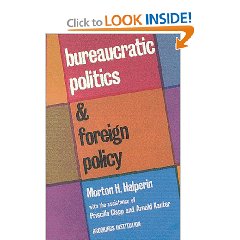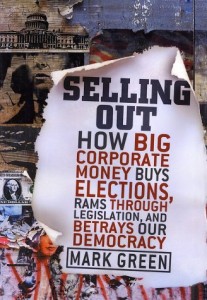1. Ignore the President, Hijack the Presidency
2. Subvert Congress and Article 1 of the Constitution
3. Lie to the People, Over and Over, Even After the Lie is Known to be a Lie
This book is quite extraordinary. It is one of perhaps ten that I consider to be lifetime essential references for any national security official–not because I condone the rules for subverting and manipulating policy that the book documents, but in order to defend against them, for in the aggregate, they all undermine both the Constitution and the power of Congress.
Part I is an introduction to national security interests, the organizations within the government that each take on a life of their own and interpret both what our foreign policy should be and how it should be pursued in their own terms, how Presidential interests–predominantly defined by domestic constituencies–compete with the bureaucracy, and how the various players from career officials to political appointees to others play against one another.
Part II, the heart of the book, dissects the many strategies for manipulating decisions within the bureacracy. The “rules of the game” include the manipulation of which agency gets the lead (tending to suppress all dissenting opinions from other agencies) to which staffer in the White House has the lead (pre-determining the outcome), to means of using foreign officials, the press, and business leaders to present supporting opinions, to manipulating the President. [Although not cited in this book, having occurred many years later, John Lehman's ability to get President Reagan to pick three names for three aircraft carriers, was sufficient to blow away the Secretary of Defense view that only two were needed…as related in his Command of the Seas.]
Part III is, if you will, the guerrilla campaign that follows a decision. As George Shultz, then Secretary of State, is on record in Congressional testimony as saying–we paraphrase from recollection: “nothing in this town is ever decided–every decision has to be refought every single day.” The author concludes his extraordinary book with the rules of the game for distorting, undermining, or extending decisions through implementation decisions and actions in the field far from Washington. We are reminded of Harry Truman's reflections on CIA, after he retired, to the effect that he had never intended for CIA to become an action arm or anything other than a central analysis organization.
I cannot recommend a more useful nor more important book to those who would seek to understand how a handful of neo-conservatives, led by Dick Cheney, were able to manipulate the President, Congress, the Armed Forces (including the silent Joint Chiefs of Staff) and the American public, into an unjust war with Iraq. Cheney knows the “rules of the game” better than anyone else including the President….this book reveals his methods of operation in a concise and easy to understand manner.
Other books that build on this one:
Vice: Dick Cheney and the Hijacking of the American Presidency
Running on Empty: How the Democratic and Republican Parties Are Bankrupting Our Future and What Americans Can Do About It
Breach of Trust: How Washington Turns Outsiders Into Insiders
Breaking the Real Axis of Evil: How to Oust the World's Last Dictators by 2025
9/11 Synthetic Terror: Made in USA, Fourth Edition
Legacy of Ashes: The History of the CIA
Books that go in the right direction:
A Foreign Policy of Freedom: Peace, Commerce, and Honest Friendship
The Paradox of American Power: Why the World's Only Superpower Can't Go It Alone
The Unconquerable World: Power, Nonviolence, and the Will of the People
The Tao of Democracy: Using Co-Intelligence to Create a World That Works for All











